Bílovec
Bílovec (Czech pronunciation: [ˈbiːlovɛts]; German: Wagstadt) is a town in Nový Jičín District in the Moravian-Silesian Region of the Czech Republic. It has about 7,400 inhabitants. The historic town centre is well preserved and is protected by law as an urban monument zone.
Bílovec | |
|---|---|
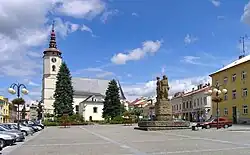 Slezské Square with the Church of Saint Nicholas | |
 Flag  Coat of arms | |
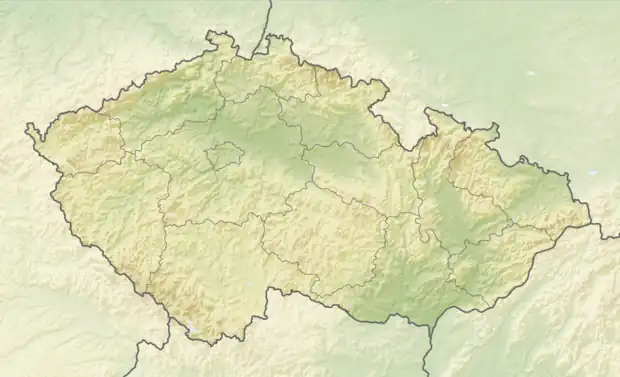 Bílovec Location in the Czech Republic | |
| Coordinates: 49°45′23″N 18°0′57″E | |
| Country | |
| Region | Moravian-Silesian |
| District | Nový Jičín |
| First mentioned | 1324 |
| Government | |
| • Mayor | Martin Holub |
| Area | |
| • Total | 38.89 km2 (15.02 sq mi) |
| Elevation | 243 m (797 ft) |
| Population (2023-01-01)[1] | |
| • Total | 7,429 |
| • Density | 190/km2 (490/sq mi) |
| Time zone | UTC+1 (CET) |
| • Summer (DST) | UTC+2 (CEST) |
| Postal codes | 742 92, 743 01 |
| Website | www |
Administrative parts
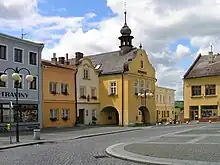
Villages of Bravinné, Lhotka, Lubojaty, Ohrada, Stará Ves and Výškovice are administrative parts of Bílovec. Výškovice forms an exclave of the municipal territory.
Geography
Bílovec is located about 16 kilometres (10 mi) west of Ostrava. It lies mostly in the Nízký Jeseník range; a small part of the territory extends into the Moravian Gate. The town is situated on both banks of the Bílovka River. Bílovec Reservoir is located on the outskirts of the town.
History
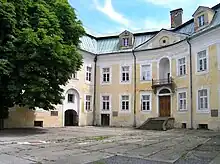
The first written mention of Bílovec is from 1324. The town was probably founded by Vok V of Kravaře between 1293–1324. It was located on the crossroads of two trade routes and belonged to the Duchy of Troppau. Bílovec was heavily fortified with walls with two gates and a fortress.[2]
In 1575–1576, the then-owner Bernard Pražma of Bílkov had rebuilt the fortress into a four-wing Renaissance castle. From 1652 until the 20th century, the estate was held by the Sedlnický of Choltice family. The town gained various privileges which allowed it to develop further. After a large fire in 1729, the castle was reconstructed in the Baroque style.[2][3]
In the second half of the 19th century, Bílovec was industrialized. A cloth factory (later a hat factory and then an iron factory), a steam saw, a book printer and a liqueur factory were established. In 1890, the railway connection was opened.[2]
Until 1918, Bílovec was part of Austria-Hungary, in the district with the same name. In 1938, it was occupied by Nazi Germany and administered as part of the Reichsgau Sudetenland, the portion of Czechoslovakia turned over to Germany in the wake of the Munich Agreement. After the conclusion of World War II, the German speaking population was expelled from the region in 1945 according to the Beneš decrees and replaced by Czech settlers.
After World War II, prefabricated houses were constructed, which disrupted the ancient character of the town.[2]
Demographics
|
|
| ||||||||||||||||||||||||||||||||||||||||||||||||||||||
| Source: Censuses[4][5] | ||||||||||||||||||||||||||||||||||||||||||||||||||||||||
Transport
The D1 motorway (the section from Brno to Ostrava) passes southeast of the town, outside the municipal territory.
Bílovec is the terminus of a short railway line from Studénka.[6]
Sights
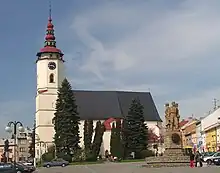
The town square is lined by preserved burgher houses. The landmarks of the square are the town hall and the Church of Saint Nicholas.[8] The Renaissance town hall with gothic cellars dates from 1593. In a baroque burgher house from the 18th century there is the town museum.[9]
The originally Gothic church was built in the 14th century. In 1771, baroque modifications of the church were made. The tower was built in 1614–1615. It is 50.67 metres (166.2 ft) high and open to the public.[10]
In the middle of the square is a giant chessboard, with an area of 8 by 8 metres (26 by 26 ft) the largest one in the Czech Republic.[9]
Bílovec Castle is open to the public. It containts several expositions and a gallery.[11]
Notable people
- Johann Ignaz Cimbal (1722–1795), Bohemian-Austrian painter
- Felix Ivo Leicher (1727–1812), Bohemian-Austrian painter
- Miloš Holaň (born 1971), ice hockey player and coach
- Květa Peschke (born 1975), tennis player
- Rostislav Olesz (born 1985), ice hockey player
- Lukáš Hejda (born 1990), footballer
- Petra Kvitová (born 1990), tennis player
- Adam Pavlásek (born 1994), tennis player
Twin towns – sister cities
 Bad Neustadt an der Saale, Germany
Bad Neustadt an der Saale, Germany Kietrz, Poland
Kietrz, Poland Lipany, Slovakia
Lipany, Slovakia
References
- "Population of Municipalities – 1 January 2023". Czech Statistical Office. 2023-05-23.
- "Historie" (in Czech). Město Bílovec. Retrieved 2022-02-18.
- "Historie zámku" (in Czech). Bílovec Castle. Retrieved 2022-02-18.
- "Historický lexikon obcí České republiky 1869–2011 – Okres Nový Jičín" (in Czech). Czech Statistical Office. 2015-12-21. pp. 1–2.
- "Population Census 2021: Population by sex". Public Database. Czech Statistical Office. 2021-03-27.
- "Detail stanice Bílovec" (in Czech). České dráhy. Retrieved 2023-09-14.
- "Gymnázium M. Koperníka" (in Czech). Město Bílovec. Retrieved 2022-02-18.
- "O městě Bílovec" (in Czech). Tourist Information Centre Bílovec. Retrieved 2022-02-18.
- "Maxišachy v Bílovci" (in Czech). CzechTourism. Retrieved 2022-02-18.
- "Kostel sv. Mikuláše v Bílovci s vyhlídkovou věží" (in Czech). CzechTourism. Retrieved 2022-02-18.
- "Zámek Bílovec" (in Czech). Bílovec Castle. Retrieved 2022-02-18.
- "Partnerská města" (in Czech). Město Bílovec. Retrieved 2022-02-18.